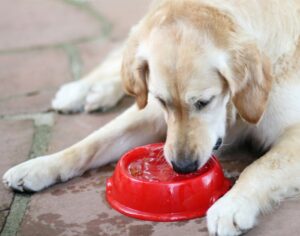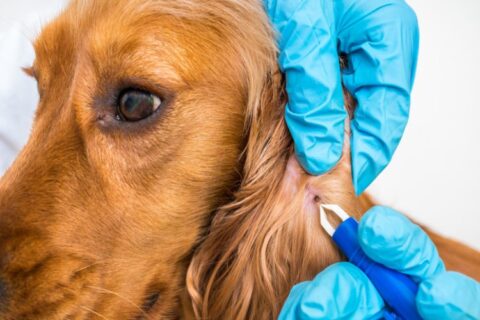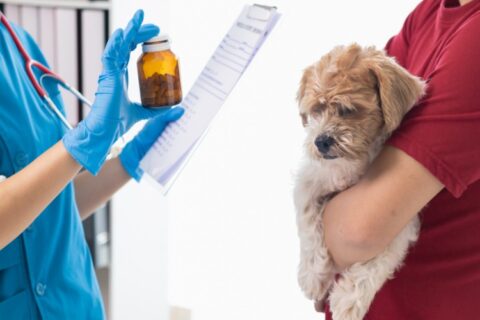Why Is My Dog Drinking a Lot of Water?
Welcome to Reed Animal Hospital’s Guide on Excessive Thirst in Dogs
 For dogs to remain healthy, they must have clean water continuously available. But what if you notice your dog drinking a lot of water? What causes a dog to drink a lot of water? And how much is considered too much? It’s easy to overlook a dog drinking too much, but it’s important to monitor your dog’s water intake to make sure he or she is healthy. Understanding what constitutes excessive thirst is the key to knowing when to seek veterinary attention for increased water consumption.
For dogs to remain healthy, they must have clean water continuously available. But what if you notice your dog drinking a lot of water? What causes a dog to drink a lot of water? And how much is considered too much? It’s easy to overlook a dog drinking too much, but it’s important to monitor your dog’s water intake to make sure he or she is healthy. Understanding what constitutes excessive thirst is the key to knowing when to seek veterinary attention for increased water consumption.
How Much Water Should Dogs Drink Daily?
A good rule of thumb is that a dog needs about one ounce of water per pound of body weight per day. In other words, a 10-pound dog would need 10 ounces, a 20-pound dog would need 20 ounces, and so on. This need varies, though, depending on the stage of life, activity level, climate, and your dog’s diet. Dogs who are very active, nursing dogs, puppies, and dogs that live in warm climates will need more water than other dogs. Dogs that eat canned food will need less water because their food contains water. Even though one ounce per pound is a general guideline, dogs should be allowed to drink as much water as they want, unless your veterinarian advises otherwise. Dogs should be allowed free access to water at all times, even overnight, because water deprivation can cause dehydration, which leads to more serious issues, including electrolyte imbalance and kidney malfunction.
Reed Animal Hospital recommends providing a continual source of clean water, and contacting your vet with any concerns about your dog’s water consumption.
Why Is My Dog Drinking So Much Water?
Dogs that drink a lot of water may do so for many different reasons. For instance, puppies drink a lot of water because their kidneys are not fully developed and don’t concentrate urine as well. Additionally, puppies are very active. Old dogs, while they are not as active, often drink more because of cognitive or medical issues. Why do dogs drink a lot of water? Let’s look at some of the other reasons for increased water consumption:
- Weather and Environmental Factors: Dogs that live in hot climates are more likely to become dehydrated They are likely to be thirstier and will need more water to stay properly hydrated.
- Diet and Food Changes: Dogs who eat wet food or diets with a high liquid content will need less water than those who eat only Switching your dog to a dry diet from wet food can make the dog drink a lot of water.
- Increased Physical Activity: The more a dog exercises, the more water he or she will need to stay
- Medications: Certain medications, including diuretics, anti-seizure medications, and corticosteroids, can cause a dog to drink more water and urinate
- Medical Conditions and Diseases: Sometimes, increased thirst is due to an electrolyte imbalance or dehydration. These can be the result of various things, like high-sodium meals, excessive heat, or illness. If your dog experiences vomiting, diarrhea, lethargy, weakness, or neurological issues, an electrolyte imbalance may be to blame. Tacky (sticky and dry) gums, ropy saliva, bright red gums, and excessive panting are all signs of If you notice any of these symptoms, seek veterinary care. Other medical conditions that can cause a dog to increase water intake include:
- Hyperthermia (elevated body temperature) or fever: This can be caused by infection, inflammation, pain, immune-mediated disease, toxin ingestion, excessive exercise, or heat stroke. If your dog has an elevated body temperature and is showing signs of dehydration, make a veterinary appointment.
- Kidney (renal) failure: A chronic progressive condition, this involves the kidneys being unable to filter waste products from the bloodstream. This can cause dehydration and can range in severity from mild to severe. Mild cases require monitoring and dietary changes, while severe kidney failure may require hospitalisation.
- Diabetes: There are different types of diabetes, and each can cause excessive thirst. The first is diabetes mellitus, a disease in which the pancreas does not produce enough insulin, resulting in a rise in blood sugar levels. As the body tries to expel the excess sugar through the urine, dog owners often notice increased thirst and urination.
Other signs include lethargy, decreased appetite, weakness, strange smelling breath, or vomiting and diarrhea, and it’s important to seek immediate veterinary care. The other type of diabetes is diabetes insipidus, a rare condition that causes excessive thirst and urination, but is not dangerous. Because owners can’t tell which type of diabetes is affecting their dogs, veterinary diagnosis and treatment is necessary. - Cushing’s disease: A condition caused by the overproduction of cortisol (e.g., endogenous steroid); it’s also known as hyperadrenocorticism. Cushing’s disease causes increased thirst and urination, along with panting, thin skin, hair loss, increased hunger, and a pot-belly appearance, but it does not require immediate veterinary attention.
- Pyometra: This is an infection of the uterus in female dogs that haven’t been spayed, and it is a life-threatening condition. Because of bacteria in the bloodstream, the dog’s kidney function may be affected, leading to increased urination, which causes increased thirst. Other symptoms of pyometra include pus coming from the vulva, fever, changes in appetite, lethargy, and vomiting. Seek immediate veterinary care, because pyometra is fatal if left untreated.
- Liver Infection: Another condition that may be fatal if left untreated, a bacterial infection of the liver can cause increased urination and increased thirst. This kind of infection may be caused by Leptospira bacteria, which is passed through infected wild animal, farm animal, or rodent urine and is found in all types of water ranging from lakes and ponds to streams, beaches or stagnant water. Dogs should be vaccinated against Leptospirosis, but if your dog swims in a pond or drinks out of rain puddles, then presents with excessive thirst, see your veterinarian for testing and treatment.
Signs That Indicate It’s Time to Take Your Dog to the Vet
Drinking a lot is not a problem by itself, but what are the red flags that should cause you to be concerned about your dog’s water consumption? Sometimes, it’s difficult to notice abnormal drinking patterns, especially if you have more than one dog. If you’re having trouble monitoring how much water your dog is drinking, there are water bowls that can help, including some that use microchip technology to identify which dog is drinking the water. If your dog has additional symptoms, like vomiting, diarrhea, lethargy, decreased appetite, panting, respiratory distress, weakness, collapse, blood in the urine, straining to urinate, or general malaise, have your pet evaluated as quickly as possible. If necessary, seek the help of an emergency veterinarian.
When to Take Your Dog to the Vet
If your dog seems to be drinking more than usual but is otherwise happy and behaving normally, it is still a good idea to make an appointment to see your vet. After obtaining a thorough history of your dog, the vet will do a physical examination and run diagnostic tests to determine any underlying issues. At Reed Animal Hospital, our veterinarians have the expertise to evaluate, diagnose, and treat medical conditions associated with excessive thirst.
Trust Reed Animal Hospital for Expert Care and Guidance
Whether your dog is drinking too much water or just needs a checkup, you can trust Reed Animal Hospital to find the answers you need, by treating your pets as if they were our own. Our goal is to help you and your pet enjoy a healthy, fulfilling life together, and in pursuit of that goal, our extraordinary team offers a wide range of services. We’ve got veterinarians, technicians, assistants, and receptionists, all prepared to help you and your pet, and we even offer referrals to specialty surgeons, many of whom will travel to our office to consult with your pet. For more information or to make an appointment, call us in Campbell at 408.369.1788, or in Saratoga at 408.647.2906, or contact us through our website.


